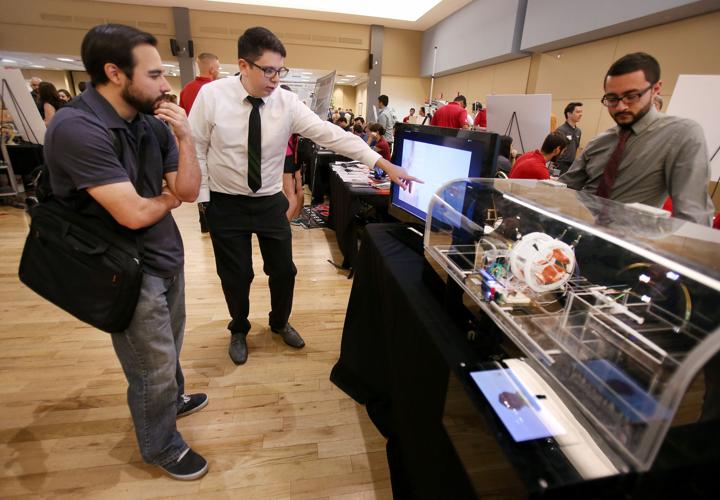It’s hard to find an event that incorporates space suits, crossbows, micro-brewing and cancer biology — but the tired engineers who worked on these technical marvels are happy to share. On Tuesday, student engineers emerged from their labs and workshops to present their projects and prototypes to the public at the University of Arizona’s Engineering Design Day.
Engineering Design Day is the final project required for student engineers to graduate. They start their projects in August and culminate them by presenting their prototype and research to their sponsors and the public. Sponsors range from giant companies to startups, and students solve real-world problems that may one day see market.
“Big companies like Honeywell and Raytheon are interested in seeing students interact with their own projects, whereby they can find good prospects to hire,” said Ara Arabyan, an associate professor and director of a College of Engineering clinic that hosts Engineering Design Day.
“The smaller companies are really trying some far-out ideas on the cheap,” Arabyan added.
It costs $8,500 to sponsor a project, but that is inexpensive for trying out and testing a prototype, Arabyan said.
“This project was more like an actual job for this company and felt like a solid research experience,” said Chris Gallo, a senior studying biomedical engineering.
Gallo’s interdisciplinary team worked on reducing medical errors in nasogastric feeding tubes. The tubes are placed in patients who cannot ingest food orally, but “two to four percent of all tubes placed accidentally go into the lungs instead of the stomach,” Gallo said.
The team’s solution was a sensor at the bottom of the tube that can detect whether it’s inside the acidic stomach. Team members were happy with their results and so was their sponsor, the local Xeridiem Medical Devices.
“We could not be more delighted with the outcome,” said Paul Melnychuck, senior director of business development, marketing and innovation at Xeridiem.
Xeridiem is filing three provisional patents based on the students’ design and plans to sponsor teams next year to continue to refine it, Melnychuck said. This was Xeridiem’s first year as a sponso.
“We had quality, talented, motivated individuals who are very smart and the cost is very affordable for a company of our size,” Melnychuck said.
At the end of Design Day, the team including Gallo won $1,000 for Best Presentation and the $1,000 Ventana Award for Innovation in Engineering.
“I can’t think of a better way to prepare undergraduates for industry than going through a capstone project like this,” said Erica Isaacs, a product development engineer at Xeridiem and a 2013 graduate of UA’s biomedical engineering program.
“You actually get the opportunity to apply the skills you learned for the past four years and be an engineer for a year, which is an invaluable experience.”
For more information on the day’s results, go to tinyurl.com/UAengineers online.





